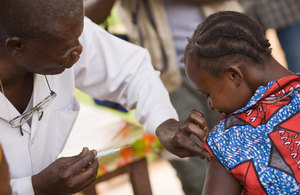Vaccines for global epidemics: apply for business contracts
Business can apply for a share of £35 million to support the clinical development of potential vaccines for 12 global priority diseases.

vaccination
The Department of Health is to invest up to £35 million in projects to develop vaccines for 12 diseases with the potential to cause epidemics in low and middle-income countries.
Vaccines prevent millions of deaths worldwide every year. However, there is a strong need to develop new vaccines and develop the effectiveness of existing ones.
The 12 diseases identified as a priority by the UK Vaccine Network are chikungunya, Crimean-Congo haemorrhagic fever, ebola, hantavirus, lassa fever, Marburg virus, Middle East respiratory syndrome, nipah, plague, Q fever, Rift Valley fever, and zika.
Projects that could be supported include ones that:
- apply emerging or existing technologies in other areas of vaccinology
- test vaccine platforms in humans to improve existing strategies
- test proven animal vaccines to support use in humans
- develop vaccines for use in animal populations to prevent spread to humans
- develop improved vaccine delivery
- develop diagnostics that demonstrate safety
- develop vaccines that protect against multiple strains of a pathogen or multiple pathogens
This is a Small Business Research Initiative (SBRI) competition organised by the Department of Health in partnership with Innovate UK.
Competition information
- the competition opens on 23 January 2017, and the deadline for registration is noon on 12 April 2017
- the competition is open to any organisation, and there must be a realistic route to exploitation
- funding will be in the form of fully funded development contracts
- we expect projects to last between 24 and 36 months
- individual contracts for clinical development up to and including phase IIb trials will be worth up to £3 million
- a briefing event for potential applicants will be held in January 2017